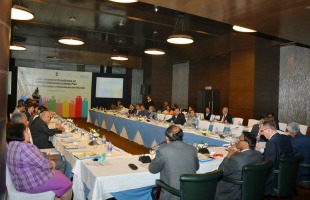An inter-ministerial consultation on National Multisectoral Action Plan (NMSAP) for Prevention and Control of Noncommunicable Diseases (NCDs) in India was held in New Delhi on 19 February 2016.

Organized by the Ministry of Health & Family Welfare (MoHFW), Government of India in collaboration with the WHO Country Office for India, the inter-ministerial consultation was held to discuss and agree on priority actions that are feasible within the purview of each Ministry.
Present on the occasion were Dr Jagdish Prasad, Director General Health Services, MoHFW; Dr Henk Bekedam, WHO Representative to India; Dr Arun K. Panda, Additional Secretary, MoHFW; and Mr Anshu Prakash, Joint Secretary, MoHFW.
Joint Secretaries and Directors from 27 Union Government ministries participated in the deliberations and endorsed the need for a multisectoral coordinated response to the NCD challenge in India, and agreed on the pivotal role that their sectors can play towards prevention and control of NCDs.
Speaking on the occasion, Dr Henk Bekedam, WHO Representative to India said, “India’s progress in developing a National Multisectoral Action Plan for prevention and control of NCDs and establishing a multisectoral coordination mechanism for its implementation represents a significant move from commitment to action.”
The Consultation was facilitated by the Additional Secretary, MoHFW. In his remarks, Dr Arun Panda emphasized on the need for coordinated actions across the various government sectors, and the urgent need to set up a mechanism for coordination and leadership to implement the National Multisectoral Action Plan for attainment of the national NCD targets.
As a part of the commitment towards the UN Political Declaration on NCDs, a National Multisectoral Action Plan (NMSAP) for prevention and control of NCDs has been developed with a prime aim to guide the multisectoral efforts to achieve national NCD targets.
Prior to the consultation, the action plan was circulated by MoHFW to 39 Departments of Union Ministries and more than 30 Departments/Ministries have nominated Joint Secretary level officers for facilitating coordination and collaboration required for national NCD response.
Premature mortality and disability caused by NCDs affects adults in their most productive age and accounts for 55% of premature mortality in the age group 30-69 years. NCDs are also closely linked to poverty and inequities. It is estimated that about 37% of all Out of Pocket Expenditure (OOPE) in India is due to NCDs.
A large proportion of NCDs are preventable or treatable. Addressing risk factors responsible for NCDs calls for action from various ministries beyond the health sector. Hence, effective and sustainable response to the health and developmental burden of NCDs requires coordinated multisectoral response with due attention to the underlying causes. This is required both at government level and at the level of other wide range of actors.
